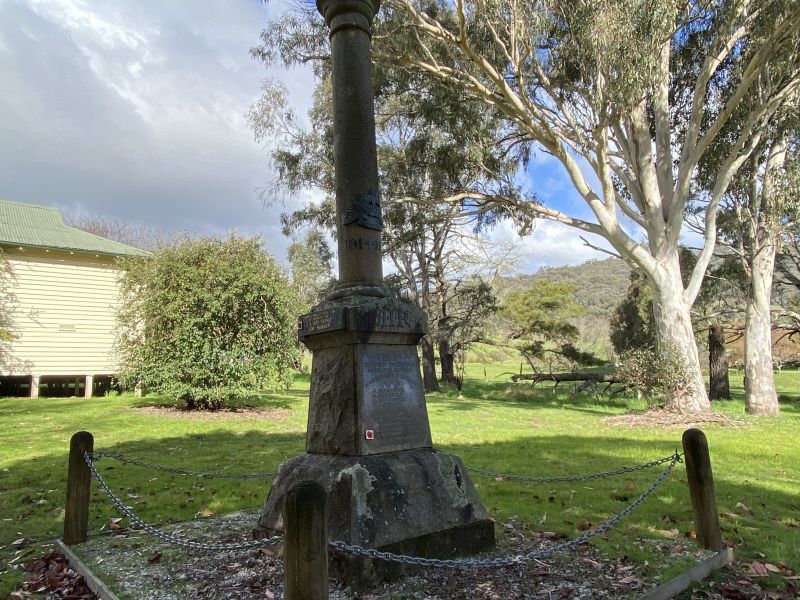Richard Hudson
Dick was born in 1890 at Granya, Victoria. He was the eldest of three children for Richard and Annie (née Carlile) Hudson. Dick would attend the Granya Public School for his education. His youngest sister, Julia, passed away in 1902 when she was only one year old. His other sister, Alice, would die in 1913 under tragic circumstances. She was brutally murdered by her estranged husband, Elliot Rollings, who then went and took his own life while awaiting sentence in Melbourne Goal. After leaving school Dick lived and worked in the Tallangatta area as a labourer.
At the age of 20, while working at Hanley’s Chlorination Works in Granya, Dick had an accident which nearly cost him his life. The 3rd of March 1910 edition of the Upper Murray and Mitta Herald reported;
“GRANYA GOSSIP
What might have been a fatal accident occurred at Messrs. Hanley’s chlorination works, on 25th ult. A young man named Richard Hudson, while engaged at the furnace, fell backwards into a heap of hot sand he had just drawn from the pit. Some of his fellow workers were close by, and tore the burning garments off Hudson, whose left arm and leg were severely burned. He was conveyed to his home, where he received first-aid treatment.”
Dick enlisted on the 22nd of February, 1915, in Melbourne. He was placed in Company of the 23rd Battalion, which was currently being raised as the third battalion of the 6th Brigade of the 2nd Australian Division. After completing their initial training the troops of the 23rd Battalion embarked on HMAT A14 Euripides on the 10th of May 1915 at Melbourne and sailed for Egypt. More training was undertaken in Egypt under hot and dusty conditions. On the 30th of August most of the battalion embarked on HT Harenford while B Company boarded HT Southland. As they sailed for Lemnos the troops were inoculated for cholera. Three days out from Alexandria Southland was struck by a torpedo from the German submarine UB-14.
As the ship began to settle it was reported that the men of the 23rd waited calmly by the sides of the ship waiting for orders to evacuate. The scene was made famous by the Australian poet C.J. Dennis in his book The Moods of Ginger Mick.
“When they socked it to the Southland wiv our sunny boys aboard -
Them that stopped a dam torpeder, an’ a knock-out punch wus scored;
Tho’ their ‘ope o’ life grew murky, wiv the ship ‘ead over turkey,
Dread o’ death an’ fear o’ drownin’ wus jist trifles they ignored.
They spat out the blarsted ocean, an’ they filled ‘emselves wiv air,
An they passed along the chorus of “Australia will be There.”
40 men out of the 1400 on board lost their lives. The ship was beached, repaired and returned to service in August the following year.
Arriving on Gallipoli on the 5th of September, the battalion was sent straight to one of the most trying sections of the ANZAC front line - Lone Pine. It appears from the battalion’s war diary that they weren’t relieved until the 18th of September when they were removed for two days “rest”.
On the 21st of October they occupied the trenches at Brown’s Dip, near Lone Pine. During the day they were shelled by Turkish guns. Dick was wounded by shrapnel and evacuated to the beach. He was taken out to a hospital ship where he died that day. He was buried at Beach Cemetery, Gallipoli, Turkey.
In November of 1915, Annie received a letter from Dick’s Company Commander, Lieutenant Howard. The letter, written in pencil and on paper marked “Fredk. J. T. Lyne, Barrister and Solicitor, Tallangatta”, was written “In the trenches” on Gallipoli on the 11th of November 1915.
“Dear Mrs Hudson
Just a line to extend to you my deepest sympathy in the sad loss of your son Pte R Hudson.
He was one of my best men, and very popular with all of his comrades. He with several others were working in the trenches when a shrapnel shell burst over them, killing one and severely wounding Pte Hudson, who died of his wounds on the Hospital ship.
His loss is greatly felt by all, I can assure you.
I am enclosing a 10/- note which he left with his section commander to get some extra food etc for him, and hope you receive it safely.
Again accept the sympathy of myself and his comrades in your sad loss
I am
Yours sincerely
Howard Lieut.”
Annie had the letter published in the 6th of January 1916 issue of the Upper Murray and Mitta Herald. The editor also included the following;
“ “Dick” Hudson, who was in his 26th year, was well known at Granya and Mitta Mitta (whence he volunteered for active service), in which centers he earned the reputation of being a crack footballer. His many friends will regret to learn of the brave fello’s death. Dick’s father went to fight in the last war Boer war and was never heard of again. His mother, who is a cripple, has lost her bread-winner. Mrs Hudson states that she has received from head-quarters no tidings whatever of her son’s fate, but she is prosecuting inquiries in the matter.”
Dick’s service records contain many items of correspondence from his mother to Base Records In Melbourne. As his father had passed away prior to Dick enlisting, Annie may have been reliant upon Dick financially. Dick had written a will but had made Jean Esme Rhodes (née Walker) the beneficiary. Jean had also been receiving a pension of 40/- per fortnight from March of 1916 as she had been made his allottee on his will. Other than Jean having been born in Mitta Mitta in 1899, the link between Dick and Jean is unknown. Annie also received a pension as it was increased from 15/- to 40/- per fortnight in March of 1916. Annie passed away in 1923, the last of her immediate family.
He is also remembered on the Australian War Memorial Roll of Honour, the Granya War Memorial and the Towong Shire Boer War and WW1 Memorial in the Tallangatta Memorial Hall. For his service during the First World War, he was awarded the 1914-1915 Star, the British War Medal and the Victory Medal.

 Stephen Learmonth
Stephen Learmonth